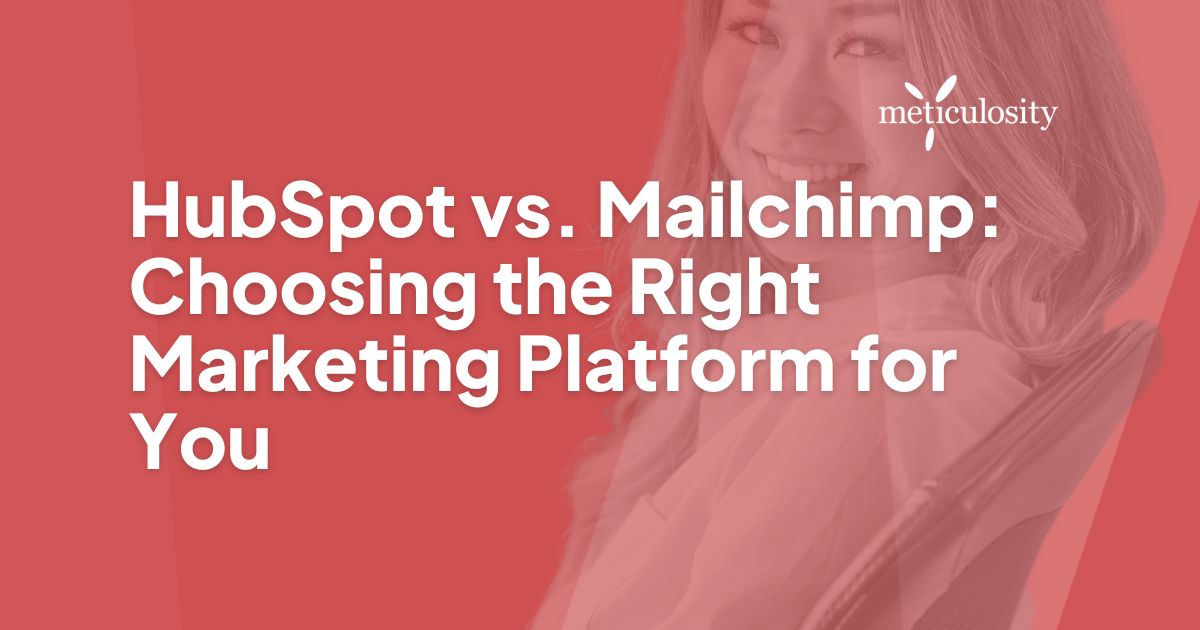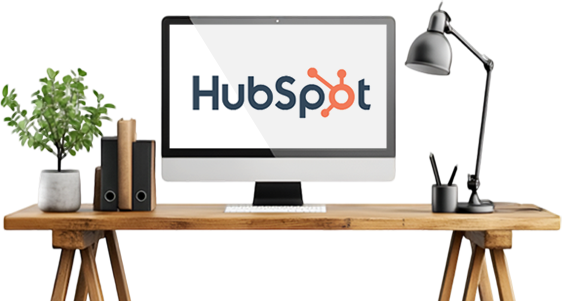Venturing into the vast universe of digital marketing platforms can often feel like navigating an intricate labyrinth.
After research and hands-on experience, we have pieced together all the crucial details about these two industry behemoths in one straightforward guide.
Key Takeaways
- HubSpot is an all-in-one marketing software that offers features like website creation, blogging, social media management, and lead tracking. MailChimp primarily focuses on email marketing and provides tools for creating web pages, setting up email campaigns, and selling products.
- HubSpot has its own CRM integration, while MailChimp integrates with popular CRM systems like Salesforce.
- HubSpot offers robust marketing automation capabilities, including workflows and lead nurturing. MailChimp's marketing automation features are more basic and centered around email marketing.
- HubSpot has strong blogging and SEO features to optimize content for search engines. On the other hand, MailChimp lacks these features and focuses mainly on email marketing.
- HubSpot includes sales and service hubs with tools like deal tracking and ticketing systems. In contrast, MailChimp focuses more on the marketing side of businesses.
Understanding HubSpot and MailChimp
HubSpot and MailChimp are two popular marketing platforms offering various features and functions to support various marketing needs.
Similarities in Features and Functions
There are several features and functions that apply to both HubSpot and MailChimp.
- Website Design & Development
- Blogging
- Search Engine Optimization
- Email Marketing
- Social Media
- Lead Nurture
- Data Tracking
Key Differences
HubSpot and MailChimp, both dominant players in the marketing software sphere, offer unique tools and features. Let's explore some key differences to help you make a more informed decision.
|
HubSpot |
MailChimp |
|
|
Primary Focus |
HubSpot is an all-in-one inbound marketing software that combines various marketing, sales, and service software solutions. |
While it has expanded its features, MailChimp is primarily an email marketing tool allowing businesses to send email newsletters to subscribers. |
|
CRM Integration |
HubSpot has its built-in CRM, making it easy for businesses to manage customer data and interactions. |
MailChimp doesn't have its own CRM but integrates with multiple popular CRM systems, like Salesforce and Zoho. |
|
Marketing Automation |
HubSpot offers robust marketing automation capabilities, including workflows, email marketing, and lead nurturing. |
MailChimp provides basic marketing automation features primarily focused on email marketing, like autoresponders and e-commerce automation. |
|
Blogging and SEO |
HubSpot has robust blogging and SEO features that help businesses optimize their content for search engines. |
MailChimp lacks blogging and SEO features, focusing more on email marketing and newsletter management. |
|
Sales and Service Features |
HubSpot includes sales and service hubs, providing tools for sales teams like deal tracking and ticketing systems. |
MailChimp doesn't offer these features, as it focuses more on the marketing side of businesses. |
Both platforms have their strengths and weaknesses, so your choice largely depends on your business needs, marketing objectives, and budget.
Target Audience
HubSpot is an excellent fit for you if your business is big or small. This tool helps make sales and marketing easier for all kinds of firms. Similarly, MailChimp also works well with both large and small businesses.
It's beneficial if you need help with email marketing only. Both platforms serve people who want to boost their company's growth through better customer engagement and more effective marketing methods.
Looking to optimize HubSpot for your business? Learn how to improve here.
Comparing Pricing Plans
When comparing pricing plans, it is important to consider both the free and paid versions offered by HubSpot and MailChimp.
Free Versions
Both HubSpot and MailChimp offer free versions of their platforms. These versions give you access to basic features but have limitations. Here is a comparison of what the free versions of both platforms offer:
|
HubSpot |
MailChimp |
|
|
CRM |
Yes |
No |
|
Email Marketing |
Yes (up to 2000 emails/month) |
Yes (up to 10,000 emails/month) |
|
Marketing Automation |
Limited |
Limited |
|
Forms and Landing Pages |
Yes |
No |
|
Integrations |
Yes |
Yes |
|
Analytics and Reporting |
Yes |
Yes |
As you can see, both platforms provide good value in their free versions. However, the specifics of what you get differ. HubSpot offers a CRM and more tools for lead generation, while MailChimp provides a higher email volume. Consider your immediate needs when choosing between the two.
Paid Plans
HubSpot and MailChimp offer a variety of paid plans to cater to different business sizes and needs. Let's take a look at a comparison table to understand these plans in more detail:
|
Starter Plan |
$50 per month |
$9.99 per month |
|
Professional Plan |
$800 per month |
$14.99 per month |
|
Enterprise Plan |
$3200 per month |
$299 per month |
|
Key Features |
SEO tools, CMS, Marketing Automation, CRM |
Email Marketing, Landing Pages, Social Media Ads |
|
Support |
Phone and Email Support |
Email and Chat Support |
These plans provide a range of features, from basic email marketing capabilities to comprehensive marketing automation and CRM functionalities. While HubSpot's plans are more expensive, they offer a more robust suite of tools and support options. On the other hand, MailChimp's plans are more budget-friendly and may be sufficient for businesses with more straightforward marketing needs.
Cost Breakdown for Key Features
Let's talk about the cost breakdown for the key features of HubSpot and MailChimp. Both platforms offer a range of features, such as automation, CRM, email marketing, analytics, templates, workflows, segmentation, campaigns, customer support, and engagement. However, it's important to consider how much you're willing to invest in these features. HubSpot offers various pricing plans with different levels of access to its features. On the other hand, MailChimp also has pricing options that allow you to select the features you need based on your budget and requirements. It's essential to carefully analyze which platform provides the most value for your money and meets your specific marketing needs before deciding.
Pros and Cons of HubSpot
HubSpot offers a wide range of features and tools, including CRM integration and automation capabilities. However, it can be expensive for small businesses.
Advantages of HubSpot
HubSpot has several advantages, making it a great marketing platform for businesses like ours. Here are some benefits to consider:
- Integrated CRM: HubSpot provides a built-in customer relationship management (CRM) system, allowing us to easily manage contacts, track interactions, and customize our sales process.
- Robust Automation: With HubSpot's automation capabilities, we can automate repetitive tasks, such as email campaigns and lead nurturing, saving us time and effort.
- In-depth Analytics: HubSpot offers detailed analytics and reporting features that provide valuable insights into the effectiveness of our marketing efforts. We can track website performance, monitor campaign success, and make data-driven decisions.
- User-friendly Interface: The platform is designed with a user-friendly interface, making it easy for marketers of all skill levels to create and manage campaigns without the need for extensive technical expertise.
- Scalability: As our business grows, HubSpot can scale with us. It offers various plans and add-ons that allow us to expand our marketing efforts without limitations.
- Extensive Template Library: HubSpot provides a wide range of pre-designed templates for emails, landing pages, blogs, and more. This makes it simple to create professional-looking content without starting from scratch.
- Personalized Workflows: We can create personalized workflows in HubSpot to automate customer journey stages based on specific triggers or behaviors. This helps us deliver targeted messages and improve engagement.
- Excellent Customer Support: HubSpot offers reliable customer support through various channels like live chat, phone support, and an extensive knowledge base. This ensures we have assistance whenever needed during our marketing campaigns.
Disadvantages of HubSpot
HubSpot may not be the right marketing platform for everyone. Here are some disadvantages to consider:
- Cost: HubSpot's pricing plans can be expensive, especially for small businesses with limited budgets.
- Complexity: The platform can be overwhelming to navigate, especially for users who are not tech-savvy.
- Learning Curve: It takes time and effort to fully understand and utilize all of HubSpot's features and functionalities.
- Limited Free Version: While HubSpot does offer a free version, it has limited features and capabilities compared to the paid plans.
- CRM Integration Challenges: Some users have reported difficulties integrating HubSpot's CRM with other systems or platforms.
- Support Limitations: HubSpot's customer support might not always provide immediate assistance or solutions to problems.
Pros and Cons of MailChimp
MailChimp offers a user-friendly interface with easy-to-use templates and robust email marketing automation features. Find out more about the advantages and disadvantages of MailChimp and see if it's the right fit for your business.
Advantages of MailChimp
MailChimp has several advantages, making it a popular choice among marketers and business professionals. Here are some of its key strengths:
- User-friendly interface: MailChimp offers an intuitive and easy-to-use platform, making it accessible to users with varying levels of technical expertise.
- Cost-effective: With its free plan, MailChimp allows businesses to get started with email marketing at no cost. Its paid plans are also reasonably priced, providing value for money.
- Email marketing features: MailChimp provides various email marketing tools, including customizable templates, automation features, and A/B testing capabilities, allowing businesses to create engaging and targeted email campaigns.
- Robust analytics: MailChimp offers comprehensive analytics that provides insights into campaign performance, audience engagement, and conversion rates. These insights help businesses optimize their marketing strategies.
- Integration capabilities: MailChimp integrates seamlessly with popular software platforms like WordPress, Shopify, and Salesforce. This allows businesses to streamline their marketing efforts by connecting different systems.
- Customer support: MailChimp offers reliable customer support through various live chat and email channels. Their responsive support team can assist users with any questions or issues.
- Scalability: MailChimp can cater to small businesses and larger enterprises' needs. It allows users to scale their marketing efforts as their business grows quickly.
Disadvantages of MailChimp
Here are some of the disadvantages of MailChimp that you should consider:
- Limited CRM functionality: MailChimp's CRM capabilities are not as robust as HubSpot's. It may not be suitable for businesses that require advanced customer relationship management features.
- Design limitations: While MailChimp offers a good selection of templates, customization options can be limited compared to HubSpot. This might restrict your ability to create unique and branded email campaigns.
- Complex pricing structure: MailChimp's pricing plans can be confusing, especially if you need additional features beyond the basic package. Understanding the cost breakdown and selecting the right plan can be challenging.
- Inflexibility in workflows: MailChimp's automation workflows have limitations regarding complex branching and conditional logic. This might impact your ability to create sophisticated automated campaigns.
- Limited integration options: Although MailChimp integrates with popular third-party applications, it may not have as many integration options as HubSpot. This could limit your ability to connect with other tools or platforms that you use for marketing purposes.
- Reporting limitations: MailChimp's reporting capabilities are less comprehensive than HubSpot's. You might find it difficult to gain detailed insights into campaign performance and make data-driven decisions.
.jpg?width=468&height=281&name=HubSpot-vs-MailChimp%20(1).jpg)
Factors to Consider
When choosing between HubSpot and MailChimp, it's essential to consider factors such as business size, marketing needs, and integration capabilities. These considerations will help you make an informed decision that aligns with your goals and objectives.
Business Size
Business size is an important factor when choosing between HubSpot and MailChimp. Both platforms cater to businesses of different sizes, so it's essential to determine which one aligns with your needs.
Small businesses can benefit from MailChimp's affordability and user-friendly interface, while mid-sized businesses may find HubSpot's advanced features and scalability more suitable.
Large enterprises often require robust CRM capabilities and integration options, making HubSpot a preferred choice. Consider your business size carefully before making a decision.
Marketing Needs
As marketers and business professionals, it's important to consider your specific marketing needs when choosing between HubSpot and MailChimp. Think about the size of your business and how extensive your marketing efforts are.
If you're a small business with basic email marketing needs and a limited budget, MailChimp could be a good fit. It offers user-friendly features, templates, and segmentation options.
On the other hand, if you're a mid-sized or large enterprise looking for more advanced automation, CRM integration, and reporting capabilities, HubSpot might be the better choice. Consider what features will help you reach your goals effectively—and don't forget to take advantage of free trials to get hands-on experience before making your final decision.
Integration Capabilities
Integration capabilities are an important factor to consider when choosing between HubSpot and MailChimp. Both platforms offer various integration options, allowing you to connect with other tools and systems you might already use in your business.
With HubSpot, you can easily integrate with popular CRMs like Salesforce and Microsoft Dynamics and other marketing tools such as Google Ads and Facebook. MailChimp also offers integrations with CRMs like Salesforce and ecommerce platforms like Shopify.
These integration capabilities can help streamline your marketing efforts by allowing data to flow freely between different systems, making tracking and analyzing your campaigns easier.
Best Fit for Your Business
Small businesses can benefit from the cost-effective and user-friendly features of both HubSpot and MailChimp, while mid-sized businesses may find that HubSpot's scalability and integration capabilities better suit their marketing needs.
Large enterprises with complex marketing strategies may prefer the advanced automation and CRM capabilities HubSpot offers.
Small Businesses
As a small business owner, you have different marketing needs than larger enterprises. Both HubSpot and MailChimp offer features that can benefit small businesses. HubSpot provides tools for lead generation, email marketing, and customer relationship management (CRM) in one platform.
It also offers automation, analytics, and templates to help streamline your marketing efforts. On the other hand, MailChimp focuses primarily on email marketing campaigns with easy-to-use templates and segmentation options.
It's more cost-effective for smaller budgets but may lack some advanced features like CRM integration. When choosing between HubSpot and MailChimp, consider your business size and specific marketing goals to find the right fit.
Mid-Sized Businesses
Mid-sized businesses have unique marketing needs that require a platform capable of handling increased complexity and scalability. When comparing HubSpot and MailChimp for our business, we should focus on features such as automation, CRM integration, segmentation, and reporting capabilities.
It's important to consider the growth potential of our company and how these platforms can support us in reaching our marketing goals. Ultimately, the best fit for mid-sized businesses will be a platform that offers robust functionality while remaining user-friendly and adaptable to changing needs.
Large Enterprises
Large enterprises have unique marketing needs due to their size and complexity. When choosing between HubSpot and MailChimp, there are a few factors that large enterprises should consider.
Firstly, the platform's scalability is crucial for handling a high volume of campaigns and customer data. Additionally, integration capabilities with existing systems and tools play a significant role in streamlining operations.
Lastly, robust reporting and analytics features are essential for making data-driven decisions at scale. Considering these factors will help large enterprises determine which platform is the best fit for their marketing needs.
Tips for Choosing Between HubSpot and MailChimp
Consider your marketing goals, conduct a cost-benefit analysis, and take advantage of free trials to help you make an informed decision.
Define your marketing goals
To choose the right marketing platform between HubSpot and MailChimp, it's important to define your marketing goals. This means knowing what you want to achieve with your marketing efforts.
Are you looking to increase brand awareness, generate more leads, or improve customer engagement? By clearly defining your goals, you can determine which platform aligns best with your needs.
Remember to focus on specific and measurable objectives relevant to your business.
Conduct a cost-benefit analysis
Before deciding between HubSpot and MailChimp, it's essential to conduct a cost-benefit analysis. This means evaluating the costs of each platform against the benefits they offer for your business.
Consider factors such as pricing plans, the features included, and how they align with your marketing goals. Assess whether the investment is worth it based on your budget and expected return on investment.
By conducting this analysis, you can make an informed decision to benefit your business in the long run.
Take advantage of free trials
During your decision-making process, taking advantage of the free trials offered by both HubSpot and MailChimp is important. This allows you to test the platforms firsthand and determine which suits your marketing needs best.
By signing up for these trials, you can explore each platform's features and functionalities without any financial commitment. It allows you to see how user-friendly they are, how well they integrate with your existing systems, and whether they provide the level of automation and analytics you require.
Ultimately, these free trials will help you decide which marketing platform is right for your business without spending a dime upfront.

Conclusion
In conclusion, choosing the right marketing platform between HubSpot and MailChimp depends on your business size, marketing needs, and integration capabilities. Small businesses may benefit from MailChimp's user-friendly features and affordable pricing plans.
Mid-sized businesses could consider HubSpot for its advanced automation and CRM capabilities. Large enterprises might prefer HubSpot's scalability and robust reporting tools. Remember to define your marketing goals, conduct a cost-benefit analysis, and take advantage of free trials when making the final decision.
Click here to learn more about HubSpot marketing.
FAQs
1. What is the main difference between HubSpot and MailChimp, and how do I choose between them for my business?
The main difference lies in the scope of services they provide. HubSpot is an all-in-one marketing, sales, and customer service platform offering a comprehensive suite of tools for businesses looking for integrated solutions. MailChimp, on the other hand, primarily focuses on email marketing and has expanded to include basic CRM features. To choose between them, assess your business needs – if you're looking for a broader range of tools and an integrated approach, HubSpot might be the choice. If your primary focus is email marketing, MailChimp could be more suitable.
2. Which platform is more cost-effective for small businesses: HubSpot or MailChimp?
MailChimp is often considered more cost-effective for small businesses, especially for those primarily interested in email marketing. MailChimp offers a free plan with basic features and scalable pricing as your needs grow. While offering a robust suite of tools, HubSpot may have a higher starting cost. When deciding between the two platforms, it's essential to evaluate the specific features you require and how they align with your budget.
3. How do HubSpot and MailChimp compare in terms of ease of use and user interface?
-
HubSpot: HubSpot's user-friendly interface offers a clean and intuitive design. It provides a unified dashboard for marketing, sales, and service tools, making navigating and managing all aspects of your customer interactions easy.
-
MailChimp: MailChimp is known for its straightforward and accessible interface. Its focus on simplicity makes it a popular choice for users who want to set up and manage email campaigns quickly. However, the interface has become more complex as it expands into additional features.
Regarding ease of use, both platforms are designed to cater to users with varying levels of technical expertise. HubSpot's comprehensiveness might initially lead to a steeper learning curve, but it provides a more unified experience.
4. Can I use MailChimp and HubSpot together, or do I need to choose one over the other?
Yes, it is possible to use MailChimp and HubSpot together, and businesses often integrate them for specific purposes. For example, you might use MailChimp for email marketing while leveraging HubSpot for broader marketing automation, CRM, and sales functionalities. Integration can be achieved through third-party connectors or APIs. However, it's essential to carefully plan the integration to avoid duplicate data or inconsistencies in your marketing efforts. Evaluate your business needs and the strengths of each platform to determine the best integration strategy for your specific requirements.







